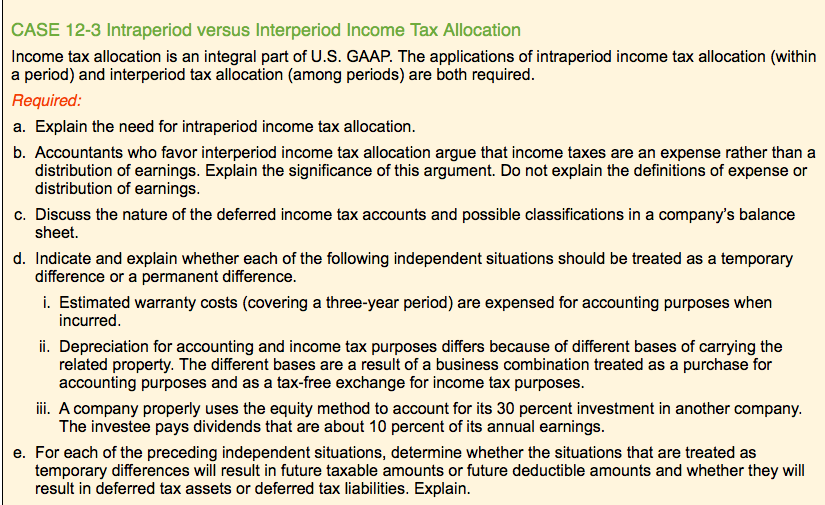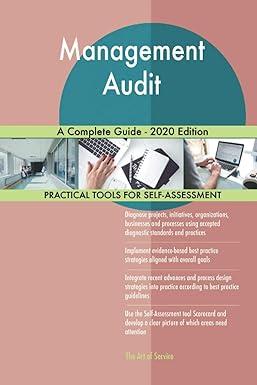Question
CASE 123 Intraperiod versus Interperiod Income Tax Allocation Income tax allocation is an integral part of U.S. GAAP. The applications of intraperiod income tax allocation

CASE 123 Intraperiod versus Interperiod Income Tax Allocation
Income tax allocation is an integral part of U.S. GAAP. The applications of intraperiod income tax allocation (within a period) and interperiod tax allocation (among periods) are both required.
Required:
- Explain the need for intraperiod income tax allocation.
Intraperiod tax allocation refers to the allocation of income taxes to show the net income or tax expense in the financial statement. Under intraperiod income tax allocation, income tax expense from ongoing operations will be recorded seperatly from income tax related to other ingredients of income on the income statement
- Accountants who favor interperiod income tax allocation argue that income taxes are an expense rather than a distribution of earnings. Explain the significance of this argument. Do not explain the definitions of expense or distribution of earnings.
- Discuss the nature of the deferred income tax accounts and possible classifications in a companys balance sheet.
- Indicate and explain whether each of the following independent situations should be treated as a temporary difference or a permanent difference.
- Estimated warranty costs (covering a threeyear period) are expensed for accounting purposes when incurred.
- Depreciation for accounting and income tax purposes differs because of different bases of carrying the related property. The different bases are a result of a business combination treated as a purchase for accounting purposes and as a taxfree exchange for income tax purposes.
- A company properly uses the equity method to account for its 30 percent investment in another company. The investee pays dividends that are about 10 percent of its annual earnings.
- For each of the preceding independent situations, determine whether the situations that are treated as temporary differences will result in future taxable amounts or future deductible amounts and whether they will result in deferred tax assets or deferred tax liabilities. Explain.
CASE 12-3 Intraperiod versus Interperiod Income Tax Allocation Income tax allocation is an integral part of U.S. GAAP. The applications of intraperiod income tax allocation (within a period) and interperiod tax allocation (among periods) are both required. Required: a. Explain the need for intraperiod income tax allocation. b. Accountants who favor interperiod income tax allocation argue that income taxes are an expense rather than a distribution of earnings. Explain the significance of this argument. Do not explain the definitions of expense or distribution of earnings. c. Discuss the nature of the deferred income tax accounts and possible classifications in a company's balance sheet. d. Indicate and explain whether each of the following independent situations should be treated as a temporary difference or a permanent difference. i. Estimated warranty costs (covering a three-year period) are expensed for accounting purposes when incurred. ii. Depreciation for accounting and income tax purposes differs because of different bases of carrying the related property. The different bases are a result of a business combination treated as a purchase for accounting purposes and as a tax-free exchange for income tax purposes. iii. A company properly uses the equity method to account for its 30 percent investment in another company. The investee pays dividends that are about 10 percent of its annual earnings. For each of the preceding independent situations, determine whether the situations that are treated as temporary differences will result in future taxable amounts or future deductible amounts and whether they will result in deferred tax assets or deferred tax liabilities. Explain. CASE 12-3 Intraperiod versus Interperiod Income Tax Allocation Income tax allocation is an integral part of U.S. GAAP. The applications of intraperiod income tax allocation (within a period) and interperiod tax allocation (among periods) are both required. Required: a. Explain the need for intraperiod income tax allocation. b. Accountants who favor interperiod income tax allocation argue that income taxes are an expense rather than a distribution of earnings. Explain the significance of this argument. Do not explain the definitions of expense or distribution of earnings. c. Discuss the nature of the deferred income tax accounts and possible classifications in a company's balance sheet. d. Indicate and explain whether each of the following independent situations should be treated as a temporary difference or a permanent difference. i. Estimated warranty costs (covering a three-year period) are expensed for accounting purposes when incurred. ii. Depreciation for accounting and income tax purposes differs because of different bases of carrying the related property. The different bases are a result of a business combination treated as a purchase for accounting purposes and as a tax-free exchange for income tax purposes. iii. A company properly uses the equity method to account for its 30 percent investment in another company. The investee pays dividends that are about 10 percent of its annual earnings. For each of the preceding independent situations, determine whether the situations that are treated as temporary differences will result in future taxable amounts or future deductible amounts and whether they will result in deferred tax assets or deferred tax liabilities. Explain
Step by Step Solution
There are 3 Steps involved in it
Step: 1

Get Instant Access to Expert-Tailored Solutions
See step-by-step solutions with expert insights and AI powered tools for academic success
Step: 2

Step: 3

Ace Your Homework with AI
Get the answers you need in no time with our AI-driven, step-by-step assistance
Get Started


